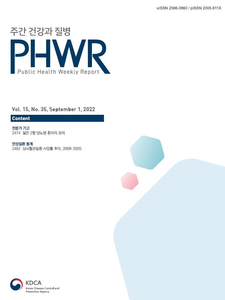Current Issue
Vol.15 No.35, September 01, 2022
-
Review & Perspective 2022-09-01
 0
0
 1542
1542
 325
325
Management of Young-onset Type 2 Diabetes
Jae Hyun Bae*
Public Health Weekly Report 2022; 15(35): 2474-2481 https://doi.org/10.56786/PHWR.2022.15.35.2474AbstractThe incidence and prevalence of young-onset ( aged <40 years) type 2 diabetes are increasing globally. Accumulating evidence suggests that people with young-onset type 2 diabetes have a more aggressive phenotype, with the development of microvascular and macrovascular complications at an early age and premature mortality, compared to those with usualonset or late-onset type 2 diabetes and type 1 diabetes. The rapid deterioration of pancreatic beta-cell function combined with insulin resistance characterizes the pathophysiology of young-onset type 2 diabetes. Modifiable and non-modifiable risk factors, including intrauterine environment, a longer duration of the disease, and traditional cardiovascular risk factors contribute to disease progression and adverse health outcomes. An increase in young-onset type 2 diabetes may impose a considerable disease burden. Therefore, the early recognition of people at risk and effective strategies to prevent or delay the course of young-onset type 2 diabetes are needed.
-
Noncommunicable Disease Statistics 2022-09-01
 0
0
 1793
1793
 439
439
Cardio-Cerebrovascular Disease Mortality Trends, 2009-2020
Public Health Weekly Report 2022; 15(35): 2482-2483 https://doi.org/10.56786/PHWR.2022.15.35.2482

pp. 287~325
Most Keyword
?
What is Most Keyword?
- It is the most frequently used keyword in articles in this journal for the past two years.
Most Read
-
Management of Technology Development Efforts to Enhance the Healthcare Establishment’s Infection Response Capabilities
Misuk An, Hyeyoung Lee, Se-Jin Jeong, Hojin Lee, Sunkyung Baek
Public Health Weekly Report 2026;19: 1-12 https://doi.org/10.56786/PHWR.2026.19.1.1 -
Status and Future Tasks of the Regional Infectious Disease Specialized Hospital Establishment Project for Responding to Large-scale Emerging Infectious Disease Crises
Jeong-won Yeom, Hae-won Cho, Ju-hong Kim, Jong-hee Choi
Public Health Weekly Report 2026;19: 13-28 https://doi.org/10.56786/PHWR.2026.19.1.2
Editorial Office
+82-43-719-7569





 Full Text
Full Text Cite
Cite


